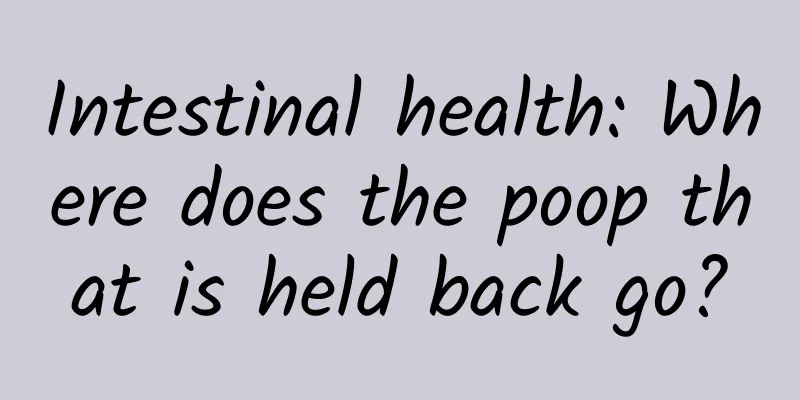Intestinal health: Where does the poop that is held back go?

|
We may wonder where the stool that we suppress the urge to defecate goes. Do they go back into the intestines and even cause intestinal blockage? After we enjoy our food, the food is broken down into a paste-like chyme by gastric acid and digestive enzymes in the stomach. The chyme then passes through the stomach's exit, the pylorus, and enters the small intestine. In the small intestine, digestive juices and bile further break down and absorb the nutrients in the chyme, while the unabsorbed food residues eventually enter the large intestine, where they further absorb water, minerals, and vitamins to form the final stool. The ultimate purpose of defecation is to be discharged from the body. Under the peristaltic action of the intestine, the stool is pushed to the end of the rectum to wait for exit. As more and more stools are waiting to exit, our intestines will have a strong urge to defecate, stimulating some sensitive nerves around the anus and transmitting defecation information to the brain. If defecation is suppressed at this time, the brain will instruct the anal sphincter to contract, causing the stool to return and be temporarily stored in the sigmoid colon and upper rectum. These stools will absorb water again, become dry and hardened, and increase the difficulty of defecation. Long-term suppression of defecation may lead to constipation or even anal fissures during defecation. Therefore, when you feel the urge to defecate, you should go to the toilet immediately to avoid stool being retained in the body. Regarding the question of whether the suppressed stool will be reabsorbed nutrients, the answer is no. The end of the colon does not have the ability to absorb those nutrients, it will only absorb some water, including some minerals and vitamins at most. Repeated suppression of defecation will cause the stool to become drier and harder, and the defecation reflex will become less sensitive due to repeated suppression. In short, you should avoid suppressing the urge to defecate to maintain intestinal health. If you are already constipated, you can try the following three tips: The first is the smart toilet. When people use a smart toilet, warm water flushing can relax the anus, thereby relaxing the sphincter and opening the anus, making it easier to defecate. The second is a low stool. Because when we sit on the toilet, the anorectal angle is sharp, which makes it difficult for us to defecate. If you put a low stool in front of the toilet, your body will naturally lean forward after you step on it with your feet, and the anorectal angle will open to 180 degrees, making it easier to defecate. The third trick is to rub the abdomen. We start from the lower right abdomen and rub upwards, then rub horizontally to the left and then downwards, rub to the lower left sigmoid colon, or even the rectum, and then press twice. This abdominal massage is effective in relieving constipation. Finally, I would like to remind everyone that when you encounter defecation problems, in addition to trying the above methods, you should also pay attention to adjusting your diet, increasing your intake of dietary fiber, maintaining adequate water, and getting the right amount of physical activity. If defecation problems persist or are accompanied by other symptoms, you should seek medical attention and professional medical help in a timely manner. Author: Dr. Chrysanthemum Lin Guole Team Reviewer: Wang Qiang, deputy chief physician of the Department of Gastroenterology, Peking Union Medical College Hospital Produced by: China Association for Science and Technology Department of Science Popularization Producer: China Science and Technology Press Co., Ltd., Beijing Zhongke Xinghe Culture Media Co., Ltd. |
>>: Poop stuck in toilet bowl: a sign of colon cancer or other health warning?
Recommend
Leucorrhea is sticky like yellow snot
Women's normal leucorrhea should be transpare...
What are the clinical manifestations of breast nodules?
Now more and more women have some breast diseases...
#千万IP创科普# How to prevent coronary heart disease? A few tips to tell you|Silver Age Science Popularization
Editor's Note Since last year, the Quanzhou S...
Zhang Hanqing丨Funny things about weight loss
In the 1980s, when I first started working, the c...
What is the phenomenon of photosynthesis in green plants? What are the products of photosynthesis?
In nature, plants are called producers in the foo...
What is the cause of red discharge in early pregnancy?
Pregnancy is an incredible thing, but now everyon...
Pixalate: Google Play Store Q2 2024 Report
In the second quarter of 2024, the number of mobi...
How to check female hormone levels
For women, if they experience irregular menstruat...
How long does it take to discharge after taking abortion medicine?
There are two ways of abortion: medical abortion ...
37 weeks pregnant, can't sleep at night
For pregnant women, many changes will occur in th...
Vaginal bleeding during bowel movement in pregnant women
After becoming pregnant, women will become more c...
What is the hemoglobin index of different buckwheat products? What is the recommended daily intake?
What is the glycemic index of different buckwheat...
How to relieve swollen feet during pregnancy
Women will experience some pregnancy reactions du...
What posture should women use to check hemorrhoids?
Hemorrhoids are a disease that everyone is afraid...









